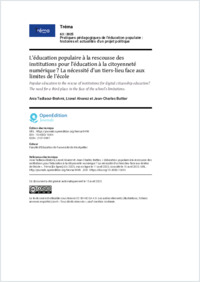Popular education to the rescue of institutions for digital citizenship education? The need for a third place in the face of the school’s limitations
HEP|PH FR
- Tadlaoui-Brahmi, Ania ORCID HEP Fribourg / PH Freiburg
- Alvarez, Lionel ORCID HEP Fribourg / PH Freiburg
- Buttier, Jean-Charles ORCID Université de Genève
- 2025
Published in:
- Tréma. - 2025, no. 63
citoyenneté numérique
culture numérique
éducation populaire politique
tiers-lieu
digital citizenship
digital culture
political popular education
third place
English
French
This article explores the inherent limitations of the institutional school context in achieving the goals of digital citizenship education (DC). Based on three communities of practice involving primary school teachers, our analysis highlights the structural constraints that hinder schools and their stakeholders from fully seize the diversity of DC practices. Consequently, the principles of “political popular education”, as conceptualized by Morvan (2011), emerge as a promising approach to overcoming these limitations. Rooted in issues of emancipation and active participation, this approach provides a favorable framework for critical discussion about DC learning methods. We suggest the use of third places, defined as pedagogical experimentation spaces established outside institutional constraints. Ultimately, this article encourages the study on the limits of institutionalized educational systems, with the goal of better addressing the challenges of a critical and engaged DC, provided this objective is effectively pursued.
Cet article interroge les limites inhérentes au cadre scolaire institutionnel face aux finalités de l’éducation à la citoyenneté numérique (CN). S’appuyant sur trois communautés de pratiques menées auprès d’enseignant·es du primaire, notre analyse met en lumière les contraintes structurelles qui limitent la capacité de l’école, et celle de ses représentant·es, à appréhender pleinement la diversité des pratiques de CN. Dans ce contexte, les principes fondamentaux de l’« éducation populaire politique », tels que conceptualisés par Morvan (2011), émergent comme une voie prometteuse de dépassement. Cette approche, inscrite dans des enjeux d’émancipation et de participation active, constitue un cadre favorable à une réflexion critique sur les modes d’apprentissage de la CN. À cet égard, notre discussion suggère le recours aux tiers-lieux, définis comme espaces d’expérimentation pédagogique et formalisés hors des injonctions institutionnelles. En définitive, cet article vise à nourrir la réflexion sur les limites des circuits éducatifs institutionnalisés, dans le but de mieux répondre aux enjeux d’une CN critique et engagée, sous réserve que cet objectif soit effectivement poursuivi.
- Faculty
- HEP|PH FR
- Language
-
- French
- Classification
- Education, teaching
- Other electronic version
- License
- Open access status
- diamond
- Identifiers
-
- DOI 10.4000/13r54
- Persistent URL
- https://folia.unifr.ch/unifr/documents/331589
Statistics
Document views: 39
File downloads:
- TadlaouiBrahmi_Alvarez_Buttier_education_populaire_Trema_63_2025: 70
